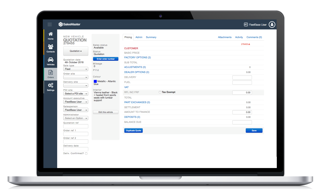By Chris Stott, managing director of SalesMaster
Successful fleet order processing is built on efficient administration, accurate cost control and excellent customer service.
Managing large order volumes, multiple customer relationships and diverse business rules can be complex.
Despite this, many fleet managers are still running their departments on excel spreadsheets and are using multiple systems for fleet orders, processing and workflows.
This is making sharing data amongst stakeholders challenging and is leading to inefficiencies in time management from potential costly mistakes, resulting from double data entry.
Vehicle order processing data needs to be managed in a way that mirrors the real world. Flexible workflow and real-time work queues allow fleet managers to effectively process fleet orders from quotation through to delivery, across multiple teams and locations.
Automating the vehicle ordering process enables fleet managers to conduct single data entry; integrate vehicle stock and manufacturer data feeds, simplifying the order processing; maintain accuracy as volumes increase; manage quotations, orders, PDI, logistics and reporting; and ensures visibility of information across a range of parties in the chain including funders, vehicle manufacturers, fleet management teams and end-users.
Fleet managers need end-to-end tools that allow them to check stock orders placed and their status in real time and generate professional and accurate quotations, as well as process invoicing from any digital device, across multiple teams and locations.
Stock can be shared between parties to enable online sales and support the digital transformation of the industry.
Fleet managers are continually facing the challenge of improving efficiencies and driving down costs, so accurate forecasting and reporting is a must.
Isn’t it time that excel spreadsheets and multiple systems become a thing of the past?


















Login to comment
Comments
No comments have been made yet.